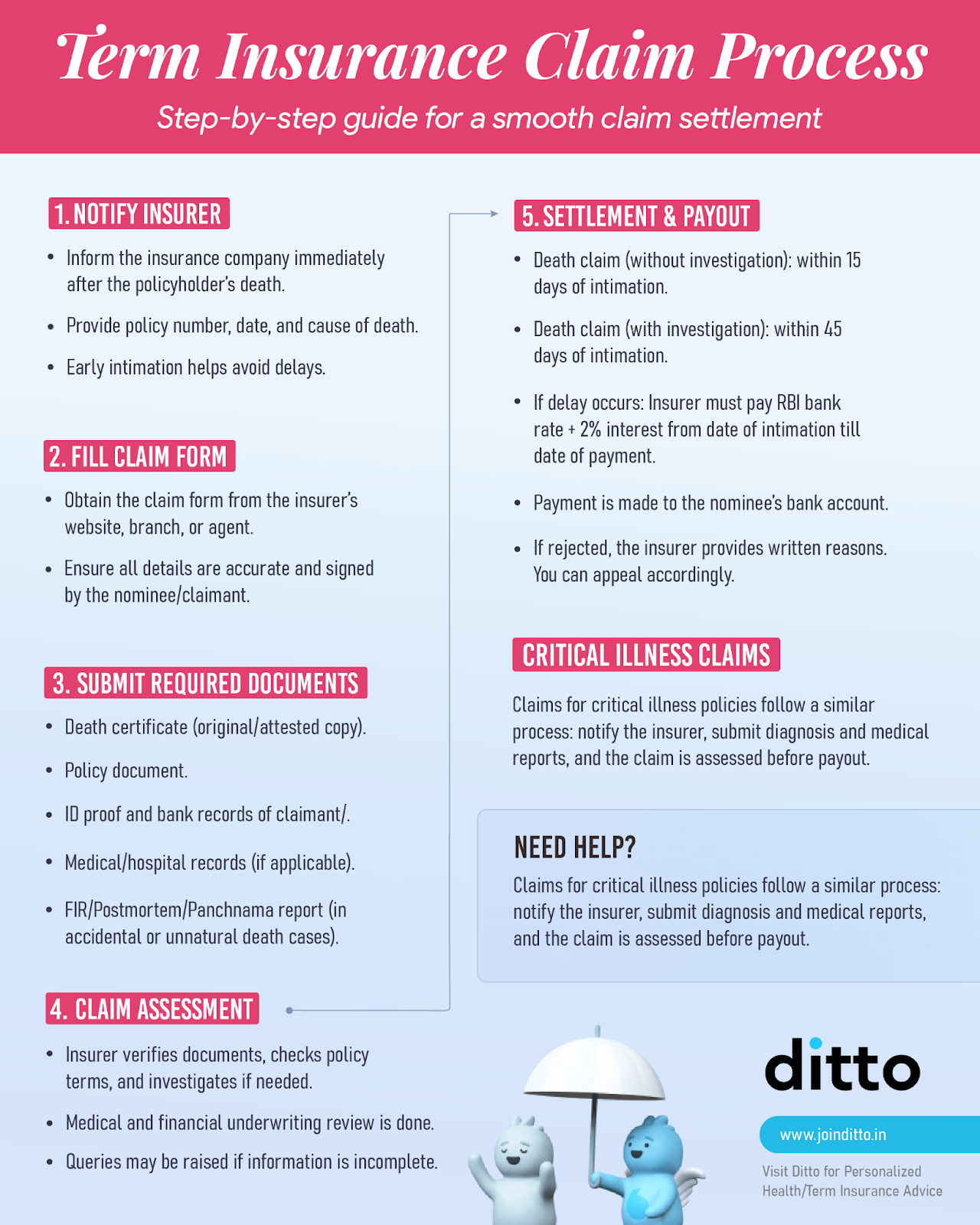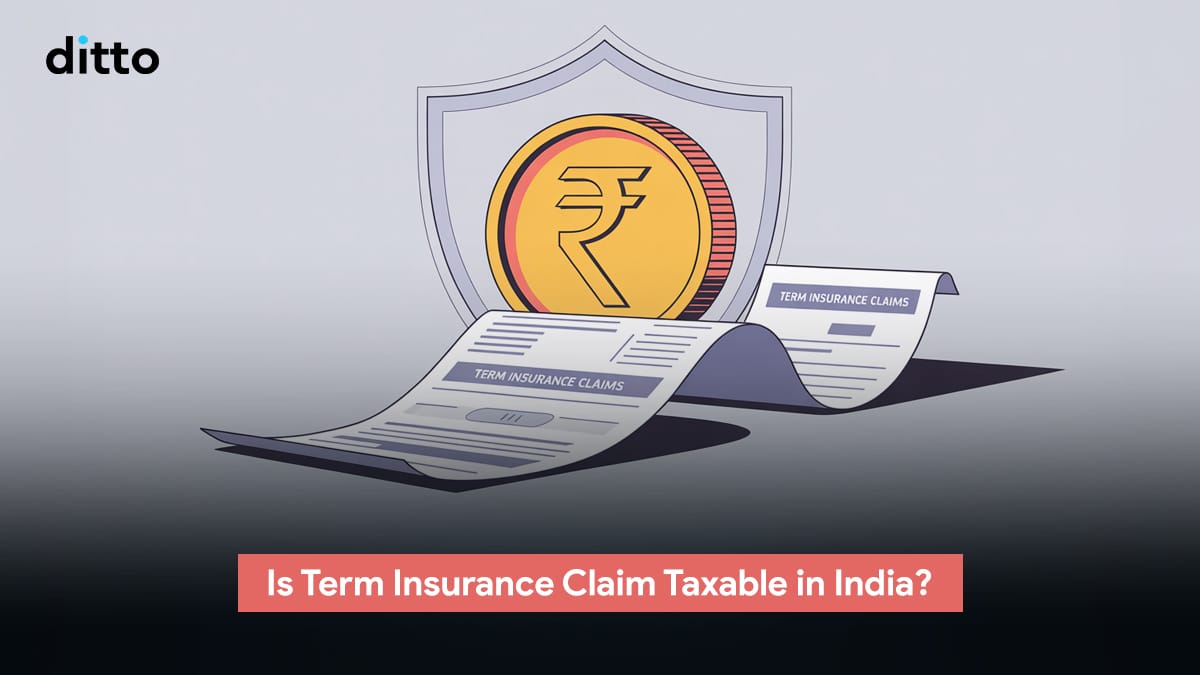What is the tax on term insurance claims?
Most term insurance claims in India are tax-free under Section 10(10D) of the Income Tax Act. Death benefits paid to nominees are fully exempt, regardless of premium or sum assured. At the same time, maturity or surrender benefits (like in Return of Premium plans) are tax-free only if the annual premium ≤ 10% of the sum assured for policies issued after April 1, 2012 (20% for older ones). If this limit is exceeded or the policy is surrendered early, the payout becomes taxable. But keyman insurance policies are usually not exempt.
Introduction
Did you know your term insurance payout is usually tax-free?
Here’s the truth. Most people don’t realize this, but in most cases, term insurance payouts are completely tax-free.
At Ditto, we speak to thousands of Indians every month who are confused about how claims and taxes actually work. So we dug into IRDAI circulars, insurer documents, and income tax rules to answer one simple question:
What is the tax on term insurance claims? The short answer: they’re usually exempt under Section 10(10D) of the Income Tax Act, 1961. But there are exceptions.
Let’s break down when your payout is tax-free and when it isn’t.
Friendly reminder: It’s easy to get lost comparing policies and premiums. Instead of spending hours on it, why not get personalized insurance advice from Ditto? We offer free consultations with zero spam! Just 30 minutes to clarify all your doubts. So book a call now.
Tax on Term Insurance Claim: Section 10(10D)
Section 10(10D) of the Income Tax Act is a powerful provision that makes most life insurance payouts in India, including term insurance, tax-free for policyholders and nominees, provided specific conditions are met. Here are a few instances where it applies:

Death Benefit
The amount paid to a nominee after the policyholder’s death is completely tax-free, no matter the sum assured or premiums paid. This applies as long as the policy is not a keyman or employer-employee plan. There are no TDS, deductions, or hidden conditions.
Maturity Benefit (ROP Policies)
If you’ve chosen a Return of Premium (ROP) term plan, the maturity payout given on survival is tax-free only if the annual premium does not exceed 10% of the sum assured (for policies issued after April 1, 2012) or 20% (for older policies).
Bonuses
Bonuses are a feature of traditional life insurance policies, including endowment, money-back, or ULIP plans. They are tax-free under Section 10(10D) when your policy meets the conditions. Return of Premium (ROP) term plans or pure term insurance plans do not have a bonus component.
If you want to learn more about Return of Premium (ROP), read our expert reviews for HDFC Click 2 Protect Supreme, Axis Max Life Smart Term Plan Plus (ROP Variant), and Bajaj eTouch. For more information on ULIP tax benefits, click here.
Tax on Term Insurance Claim: Terms and Conditions
To ensure your term insurance claim is fully exempt from tax under Section 10(10D), the following conditions must be met:
- Policy Type: Must be an individual term insurance plan. Death claims paid to an employee’s nominee under an employer’s Group Term Life Insurance (GTLI) policy are also tax-exempt.
- Premium-to-Sum Assured Ratio:
1) Policies issued after April 1, 2012 → Annual premium ≤ 10% of sum assured.
2) Policies issued between April 1, 2003, and March 31, 2012 → Annual premium ≤ 20% of sum assured.
3) Exceeding these limits can make maturity or surrender payouts subject to taxation. - Maturity/Surrender Claims: Tax exemption applies only if your annual premium is within 10% of the sum assured (called the premium ratio), and you’ve held the policy for the minimum required duration, typically 2 years for traditional plans or 5 years for ULIPs (this is the holding period condition standard across all ULIPs).
- Death Claims: The payout to a nominee is always tax-free under Section 10(10D). However, any interest or gains earned after receiving the money (like bank interest, dividends, or investments) are taxable, with no exemption threshold.
When Is Term Insurance Payout Tax-Free?
A term insurance payout is fully tax-free when the policy is an individual plan, the death benefit to the nominee has no upper limit, and maturity or surrender claims follow the prescribed premium-to-sum-assured ratios (10% for policies after 2012, 20% for older ones). Payouts from riders like accidental death, disability, or critical illness are generally tax-free as well.
But for this to apply, all claim documents must be complete.
When Does Tax on Term Insurance Claim Apply?
Even under Section 10(10D), term insurance payouts can become taxable in certain situations:
- If the annual premium is higher than allowed limits (10% for policies after April 2012, 20% for older ones)
- The policy is surrendered or terminated within two years
- It’s a keyman or employer-provided policy
- Return of Premium (ROP) plan doesn’t meet its premium or policy conditions.
Here’s a quick look at what our Ditto’s advisors recommend to ensure smooth claim settlement:

Why Talk to Ditto for Term Insurance?
At Ditto, we’ve assisted over 8,00,000 customers with choosing the right insurance policy. Why customers like Arun below love us:

✅No-Spam & No Salesmen
✅Rated 4.9/5 on Google Reviews by 15,000+ happy customers
✅Backed by Zerodha
✅Dedicated Claim Support Team
✅100% Free Consultation
You can book a FREE consultation here. Slots are running out, so make sure you book a call now.
Tax on Term Insurance Claim: Ditto’s Take
At Ditto, we believe that understanding the tax benefits of term insurance is key to making informed financial decisions. Unlike investment-oriented plans, term insurance is not about generating returns; it’s about certainty and reliable protection. The law recognizes this purpose, making death benefits completely exempt, regardless of policy size, tenure, or premium.
This fundamental rule makes term insurance transparent, efficient, and reliable, giving your loved ones full financial protection when they need it most. At Ditto, we’re committed to helping you understand these details so you can make confident insurance choices that fit your needs.
Frequently Asked Questions (FAQs)
Who can claim tax benefits on term insurance premiums?
Individual policyholders or Hindu Undivided Families (HUFs) paying premiums can claim deductions under Section 80C of the Income Tax Act, up to ₹1.5 lakh annually.
Should you buy a term plan just for tax benefits?
No. The primary purpose of term insurance is to provide financial protection to your family. Tax benefits are a valuable secondary advantage, but should not be the sole reason to buy a plan.
Are maturity returns from Return of Premium (ROP) policies always tax-free?
No. These returns are tax-exempt only if the premium-to-sum-assured ratios and holding periods meet the conditions prescribed under Section 10(10D). Failure to meet these conditions may lead to taxation of maturity proceeds.
Are employer-provided or keyman insurance claims tax-free?
Generally, no. Payouts from employer-provided or keyman insurance policies are taxable in the hands of the recipient, as these are considered a business or salary benefit.
Last updated on:










